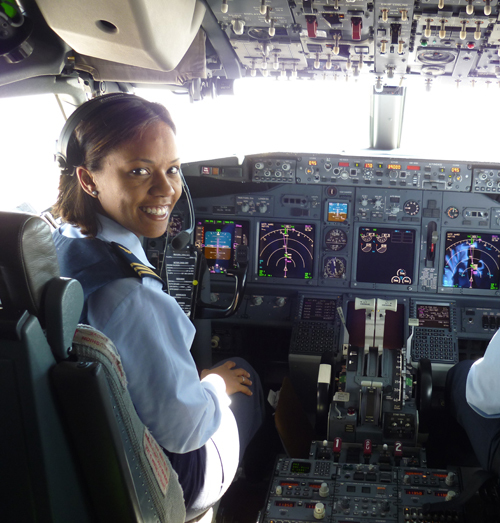Flying safe with UCT's legal eagle
16 September 2016 | Story by Newsroom
Tamara Thomas is a final-year law student at UCT. She is also a lieutenant colonel in the South African Air Force (SAAF), and has been flying planes for more than a decade. Thomas shared a snippet of her story with Yusuf Omar.
YO: I'll hazard a guess that you're the only air force pilot in your final-year law class, no?
TT: To my knowledge, yes.
YO: To a civilian like me, what does a lieutenant colonel in the SAAF do?
TT: Job descriptions may vary within the air force, as not all lieutenant colonels perform the same function or are employed in the same line of work, such as engineering, logistics, HR, there are pilots, and so on.
More generally, lieutenant colonels form part of senior management on base level, commonly known as the Base Command Council. I am staffed as a pilot at Air Force Base Ysterplaat and am also currently in charge of all flight safety related matters, occupational health and safety, and environmental affairs on the base, over and above flying duties. I am currently the only female lieutenant colonel at Air Force Base Ysterplaat and the youngest.
YO: Which is your favourite plane to fly?
TT: The Dassault Falcon 900, a French-built corporate jet aircraft made by Dassault Aviation. The South African Air Force has one in its fleet stationed in Pretoria – it is used to fly the deputy president at the VIP squadron where I was stationed from 2008 to 2013.
The Boeing 737-700 is a close second.
YO: What do you love about flying and being in the air force?
TT: What is there not to love about flying! The cockpit is definitely the best office in the world. No flight is ever the same and you get to travel the world. It's an exhilarating feeling being at the controls of an amazing piece of machinery.
But along with the adrenaline comes enormous responsibility as you are responsible for the safety of your passengers.
The pressure is definitely intense when your passengers are the president, deputy president and minister of defence. With regards to the air force, I maintain that the standard of training is among the best in the world. During my 14 years of employment with the air force to date, I have been afforded opportunities for which I am truly grateful. Further, military discipline has stood me in good stead in various aspects of my life thus far.
YO: Any memorable moments that you'd like to share?
TT: Flying and meeting former president Nelson Mandela was truly a highlight of my career.
Also the first time I went on solo as a pupil pilot – a milestone for any young pilot.
YO: With law and pilot duties, where do you find the time?
TT: I have resigned myself to the fact that there is never enough time! I take one day at a time – it's the only way I can maintain my sanity.
YO: It sounds as if you've had an interesting journey. How did you end up where you are now?
TT: My love of all things flying-related started at a very young age. My parents initially thought it was a phase that I would grow out of – I didn't, and they soon realised that I was intent to pursue flying as a career.
Being from a middle-income background, my parents were unable to afford the exorbitant costs of private flying lessons and looked for other alternatives. I applied to the South African Air Force for pilot selection. I was accepted and joined the air force straight from school. Three years of intensive training later, I qualified as a pilot. I was initially stationed in Pretoria flying light transport aircraft. I then progressed to multi-engine turbo-prop aircraft and later multi-engine jet aircraft.
The highlight of my career was flying at the VIP presidential squadron, where we were responsible for the transporting the president, deputy president and the minister of defence on all official trips.
In 2013 the air force offered me an opportunity to study further and obtain a degree, while still working. Having started flying immediately after matric, I thought it invaluable to obtain a tertiary qualification. While flying is my passion, there will come a day when I may no longer be able to fly and one must always have options available to you.
YO: How do your career in the armed forces and your career in law dovetail? Are you planning to continue with both, or tie them together somehow?
TT: The intention was to bridge the gap between aviation and the law, particularly when it comes to aircraft accident investigations and flight safety policies. While we have pilots that understand the technicalities of flying, the law officers often need assistance when drafting and finalising boards of enquiry, policy and legislation relating to air traffic and flight operations, and so on. I believe that having a background in aviation and law will prove invaluable when it comes to future career prospects.
YO: What does a soldier do in her spare time, if you have any?
TT: At this point in my life, as a final-year law student, it's probably to catch up on sleep. Otherwise spending time with family and friends is always great.
Story Yusuf Omar. Photo Supplied.
 This work is licensed under a Creative Commons Attribution-NoDerivatives 4.0 International License.
This work is licensed under a Creative Commons Attribution-NoDerivatives 4.0 International License.
Please view the republishing articles page for more information.










